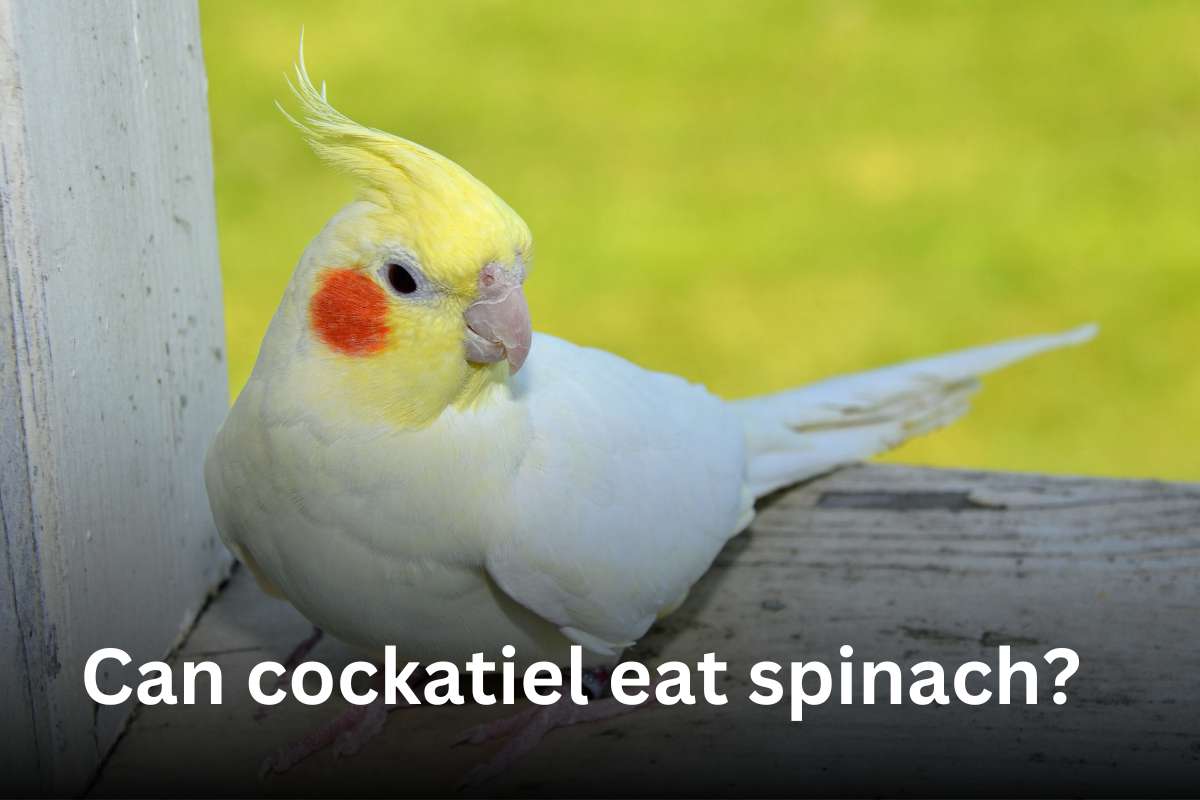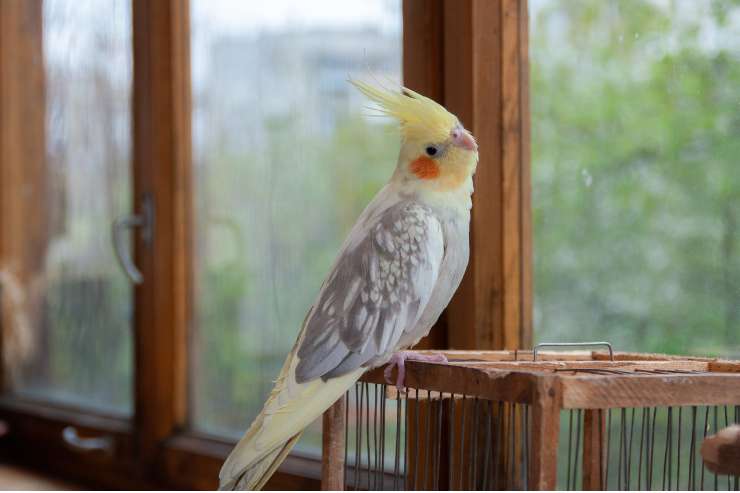can cockatiel eat spinach?

Cockatiels are one of the considerable popular pet birds, recognized for their pleasant personality and stunning crests.
A healthy and happy cockatiel requires a well-balanced diet. Although seeds and pellets are the foundation of their diet, fresh fruits and vegetables are equally essential. Spinach is a common vegetable that pet owners frequently wonder about.

Can Cockatiels eat Spinach? The answer is yes but with several key exceptions.
This article will look at the benefits and risks of feeding spinach to cockatiels, providing detailed guidance for bird owners.
Nutritional Benefits of Spinach
Spinach is a nutrient-dense, leafy green vegetable that provides several health benefits to cockatiels.
It is high in vitamins and minerals, which are necessary for the overall health of birds. The critical nutrients found in spinach are:
- Vitamin A: It is essential for maintaining normal vision, skin, and immunological function.
- Vitamin C: Vitamin C is an antioxidant that saves cells from damage and boosts the immune system.
- Vitamin K: It is vital for bone health and blood clotting.
- Iron: Required for the formation of hemoglobin, which transports oxygen in the blood.
- Potassium: It promotes fluid balance and nerve function.
- Calcium: Calcium is necessary for bone strength and normal muscular function.
- Magnesium: It promotes muscular and nerve function, as well as energy production.
These nutrients can improve a cockatiel’s health by supporting a variety of biological activities, including bone formation and immune response.
However, while spinach is highly nutritious, it should not be the only source of these elements.
Potential Risks of Feeding Spinach to Cockatiels
Despite its nutritional benefits, spinach contains chemicals that might be harmful to cockatiels if fed in large quantities. The main worry is the presence of oxalates.
Oxalates are naturally occurring chemicals present in numerous plants, including spinach. When consumed, oxalates can bind to calcium, forming calcium oxalate crystals.

This binding may hinder calcium absorption, potentially resulting in inadequacies. A high oxalate intake can be detrimental to cockatiels, who require appropriate calcium for healthy bones and overall health.
Calcium deficiency in cockatiels can result in several health issues, including:
- Weak Bones: A lack of calcium can cause brittle bones, which increases the risk of fracture.
- Egg Binding: If female cockatiels do not get enough calcium, they may have difficulty laying eggs.
- Muscle Weakness: Calcium is crucial for bone health and muscle contractions. A lack can result in weakness and tremors, highlighting the importance of calcium for overall bird health.
- Metabolic Bone Disease: It is a severe illness that impairs bone structure and strength.
To reduce the hazards linked with oxalates, offer spinach to cockatiels in moderation. Spinach should be part of a balanced diet that includes other vegetables with lower oxalate levels.
Offering spinach as an occasional treat instead of an everyday meal can help guarantee that your cockatiel gets the nutritional benefits while avoiding the potential negatives.
How to Safely Feed Spinach to Cockatiels?
To assure your cockatiel’s safety and benefit from spinach, follow these guidelines:
Wash Thoroughly: Wash spinach leaves thoroughly to remove pesticides and pollutants. Organic spinach is recommended to lower the danger of chemical exposure.
Serve Fresh: Instead of cooked spinach, serve it fresh. Cooking can lower the nutritional value of vegetables.
Chop Finely: Cut the spinach leaves into small, manageable pieces to make it easier for your cockatiel to consume.
Mix with Other Foods: Combine spinach with other vegetables to create a well-balanced diet. Carrots, broccoli, bell peppers, and low-oxalate leafy greens such as kale are also good selections.
Limit Quantity: Give tiny amounts of spinach, such as a few leaves, once or twice each week. This helps prevent oxalate overconsumption.
Observe Your Bird: Watch for adverse reactions or behavioral changes in your cockatiel after eating spinach. If you notice any problems, see an avian veterinarian.
Alternatives to Spinach
If you are concerned about the oxalate concentration in spinach, consider these other veggies that are safe and nutritious for cockatiels:
- Kale: Low in oxalates and high in vitamins A, C, and K
- Broccoli: Broccoli contains vitamins C and K, as well as fiber.
- Carrots: It is an excellent source of vitamin A and beta-carotene.
- Zucchini: Low in calories and contains vitamins A and C.
- Bell peppers: Bell peppers are high in vitamin C and antioxidants.
These alternatives can be alternated with spinach to provide a varied and balanced diet for your cockatiel.
Conclusion
Spinach can be a beneficial addition to a cockatiel’s diet if given in moderation. Its high vitamin and mineral content can assist your bird’s health, but the presence of oxalates requires careful feeding.
Wash, chop, and serve spinach on occasion, along with other low-oxalate veggies, to properly integrate this leafy green into your cockatiel’s diet.
Always remember that your cockatiel’s health depends on a well-balanced diet. Combining seeds, pellets, fresh fruits, and a range of veggies can keep your feathered companion healthy and active.
If you have any questions about your cockatiel’s nutrition, contact an avian veterinarian for specific guidance and recommendations.
Frequently Asked Question
How often can I feed spinach to my cockatiel?
To avoid potential health problems associated with oxalate consumption, offer spinach as a little treat, such as once or twice a week.
What are the nutritional benefits of spinach for cockatiels?
Spinach contains vitamins A, C, and K, as well as minerals such as iron, calcium, magnesium, and potassium, all of which benefit a cockatiel’s health.
Is it necessary to consult a veterinarian before feeding spinach to my cockatiel?
While not strictly necessary, seeing an avian veterinarian is a good idea, especially if you are concerned about your cockatiel’s food requirements or if it has any pre-existing health issues.


